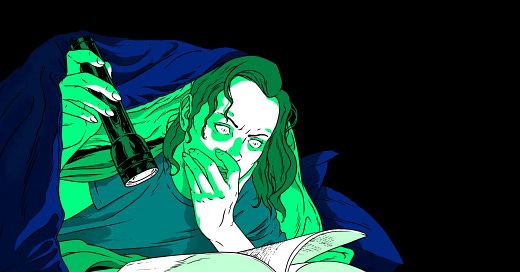The last eight months, etc.
Dear friends,
I last wrote to you on Friday, March 6, sharing my excitement about the unsealing of T.S. Eliot's letters to Emily Hale and mentioning, in an aside, that it might not be a good time to read Station Eleven, Emily St. John Mandel's brilliant novel about the aftermath of a global pandemic. That was the last normal weekend of the old world.
I got up early the next morning to go to the gym before my husband boarded a plane for a business trip to Paris. That evening, I attended a small concert hosted by faculty and alumni of the music camp I attended as a child. Many of the audience members had flown in from San Francisco, which was about one week ahead of New York, pandemic-wise. The Californians, clearly uneasy about being in an enclosed space with several dozen people, approached the buffet warily. Elbow bumps were awkwardly exchanged. The East Coasters shared confused glances. Did they know something we didn't?
By the time another week was up, we understood that life as we knew it was not going to continue. The Eliot letters were untouchable in the Princeton library, closed for the foreseeable future. There were no trips to the gym, no flights to Paris, no concerts. As the walls of the city began to close around us, by day I struggled to keep track of the new reality even as it slid out from beneath my feet, a process that found its way into this New York Times piece about keeping a coronavirus diary. At night I retreated into a fog of anxiety and insomnia, each self-destructively feeding on the other.
I spent some of those sleepless nights reading a new collection of novellas by Stephen King, which turned out to be oddly comforting pandemic reading. (The piece ran on the cover of the New York Times Book Review, a small thrill.) Other than that, I didn't do much new writing for the rest of the spring. I read novels voraciously and indiscriminately, often in long stretches during the night, using my Kindle so as not to wake my husband. During the day, I baked sourdough bread, like everyone else, and tried to keep the ship of my household afloat.
By now, the panic of the early Covid days has faded. My youngest child is in school again, and I've gotten back into a work routine, or something like it. I spent part of the summer immersing myself in translations of Beowulf to write this piece for The New Yorker, on a rollicking new version by Maria Dahvana Headley, and eked out this essay on the Irish writer Eimear McBride's sexually explicit novels, in which I remembered an adventurous high school friend and wondered why sex isn't more central in women's writing.
And, most exciting, the Library of America brought out the second volume of Jackson's works, this time edited by me, with a much-corrected chronology of her life. It was especially meaningful to be part of this project, because the first Library of America Jackson anthology was what got me started on my Shirley Jackson path in the first place. I wrote about that in a blog post on their website.
We may have settled into a new routine. Even so, let's not forget the anguish of those days in March and April, when our world all but came to an end. Now we're at a turning point potentially even bigger than the arrival of Covid. It feels to me as if a seismic shift of some kind is ahead. I hope you can find whatever you need to get through the next few days (or weeks?)—alcohol, edibles, worry beads, prayer. I'll be reading my way through the nights.
All best,
Ruth
"No live organism can continue for long to exist sanely under conditions of absolute reality; even larks and katydids are considered, by some, to dream."—Shirley Jackson, The Haunting of Hill House



